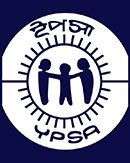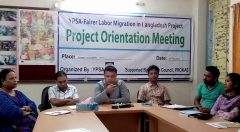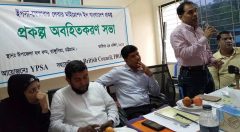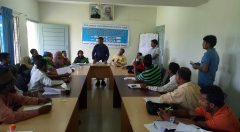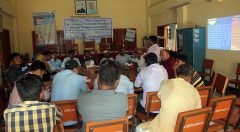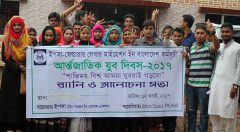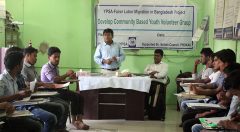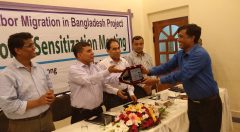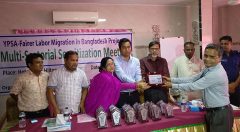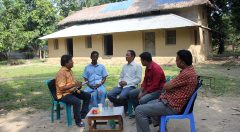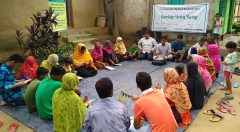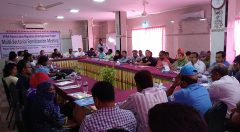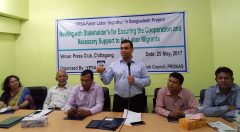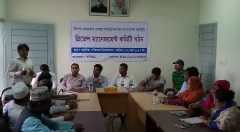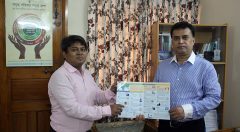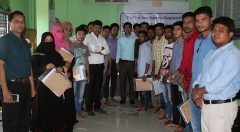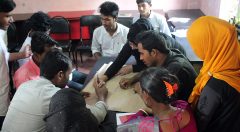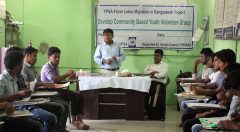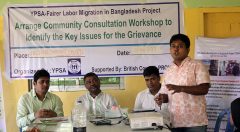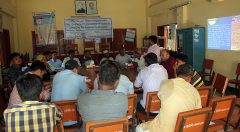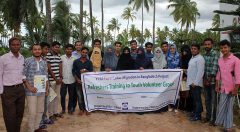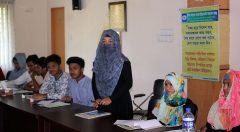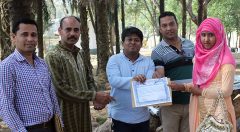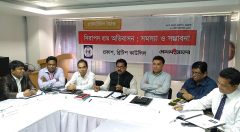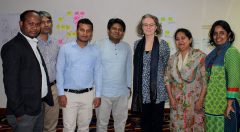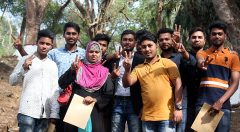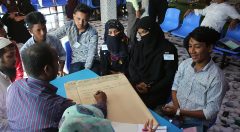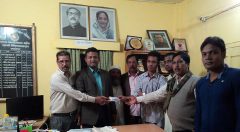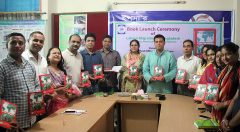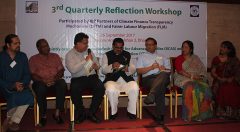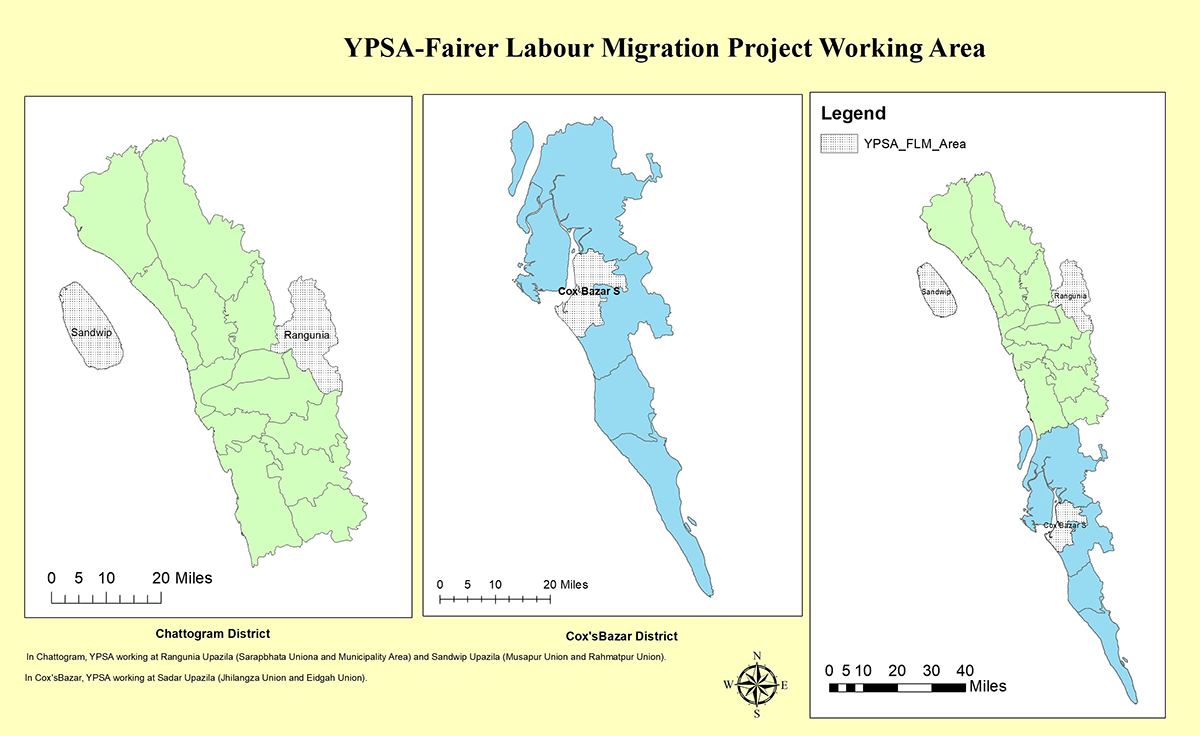Photo Gallery
Background and Rationale:
Labor migration is increasingly being recognized as a viable livelihood option for many poor people and one of the major development issues for Bangladesh. More demand for manpower from Bangladesh is coming from some South East Asian countries in addition to the Middle Eastern countries. The growth in migration from Bangladesh and the increasing levels of remittances and consequent benefits to the society and the country are not without its challenges. Most of migrant labor force working in other Asian countries and in particularly, the Middle East. Due to the employment rate being much higher at rural and sub-urban areas, most of these migrant labors come from poor and middle income socio-economic settings. Fact is, the bulk portion of our labor force have a very limited literacy and skill level and have therefore, migrated as unskilled labor.
Due to their limited literacy level, unavailability of relevant information and proper consultancy service, most of these migrants labor suffer from more or less the same problems. These includes, cheating by the middleman, fake and unregistered travel agencies and bankers in the name of free visa, fraud and deception by recruiters, physical and/or sexual abuse from employers, squalid living conditions, poor access to health care and other services, irregular and insufficient pay for long work hours in difficult physical conditions, and socially marginalization in host countries. steady job and other facilities, procedural problem in some legal institutions in the importing countries causes delay in disposal of cases of labor problems for getting their proper dues, nonpayment, underpayment, delayed payment, poor living conditions, refusal to provide air tickets at the time of exit, non-adherence to the terms and conditions of employment by the sponsors, sometimes as soon as the worker reaches the host country, the agreement is substituted by a new agreement having low wages, substandard accommodation, no free food and other lower fringe benefits, etc. In case of accidents it takes years to get the death compensation by the next of kin due to complexity of legal procedures of the host countries. Sometimes workers are repatriated after becoming handicapped temporarily or permanently due to some accident without proper treatment or compensation. Moreover, some social leaders and government officials are also heard to be taking advantage of their lack of knowledge.
Keeping all the situation in mind YPSA has been implementing Fairer Labor Migration Project with the support from Promoting Knowledge for Accountable Systems (PROKAS) Programme of British Council from January 2017. This project is working for improving the transparency and accountability of the migration process and also promotes participants on safe migration. The project working through five partners (RMMRU, BOMSA, WARBE, YPSA and IID) on different territory in Bangladesh. The project uses the political momentum which was generated by Bangladesh hosting the GFMD in December 2016 to support partners from civil society to use this opportunity to present and represent the perspectives of citizens at the national level. YPSA has been implementing a pilot project in Chittagong, Rangunia Upazilla and Cox’s Bazar, Sadar Upazilla. This areas are prone of labor migration of Bangladesh.
Objectives of Project:
- The project aims to improve the transparency and accountability of the migration process. It will do this through supporting work by multiple stakeholders which increases the fairness of the labour migration system by reducing the scope for corrupt practice and supporting the development of mechanisms to enhance informed decision-making by migrants.
- The project will initially look to use identified entry points to support civil society actors in their work to influence systemic and institutional changes related to the role of intermediaries in informal labour migration practices. The project will continue to explore other identified opportunities to backstop the system change through initiatives that build the capacity of migrants to make informed choices.
Funded By: PROKAS (Promoting Knowledge for Accountable System), British Council,
Duration of Project:
1st Phase: 01 January 2017 to 12 December 2019
2nd Phase: 13 December 20219 to 12 October 2021
Geographic Location:
The project has been implementing on Chattogram , Rangunia Upazilla ( Sarapbhata Union and Municipality Area of Rangunia Upazila), Sandwip Upazila (Musapur Union and Rahmatpur Union) and Cox’s Bazar, Sadar Upazilla (Jhilonza and Eidghaon Union).
Categories of Target Population: Labour Migrants (particularly Aspirant), Returnee Migrants and their Family members, Migration Related Organization (GO and NGO’s), Recruiting Agencies, Training Center and Middleman.
Major Activities:
- Conduct a research to identify the challenges and needs in fairer migration especially for the Youth and minority groups
- Conduct mapping on power dynamics in relation to fairer migration
- Develop database and register migrants’ families, potential migrants, recruiting agencies and Middleman (dalal) in targeted project areas
- Produce number of case studies on challenges, grievance and systems on fairer migration at local level for sharing it with respective stakeholders and link with national advocacy.
- Organize meeting with different stakeholders like DEMO, recruiting agencies, District Probashi Kollyan Desk, local administration, various training centres etc. for ensuring the cooperation and necessary services to the migrant people.
- Lobbying with local administration (Upazilla Nirbahi Office) to include migration issue in their monthly coordination meeting agenda.
- Arrange Media briefing on the status of migration in the project area based on the findings of baseline survey and progress monitoring
- Setup and run Fairer Migration Support Centre (FMSC) at working area to receive any grievance from the community and provide information on fairer migration process documentation and facilitate migrants to follow the process.
- Provide training to the facilitators of Fairer Migration Support Centre (FMSC) and Union Digital Centre (UDC) on the migration rules and regulation, grievance mechanism in the FMSC and in engaging with vulnerable migrants.
- Receive and maintain record of the complains at FMSC by the facilitators as per the operational manual and issue a receipt. .
- Facilitate Fairer Migration Support Centre (FMSC) and arranging social mediation to resolve the received complains in Fairer Migration Support Centre.
- Refer grievance by FMSC to BMET through DEMO office or other agencies
- Provide capacity development training on fairer migration process and their roles and responsibility, code of conduct to FMSC
- Monthly reflection meeting with youth volunteer for analyzing and identify further action.
- Develop Community based youth volunteer group and Provide capacity development training to youth volunteer group for working on Fairer migration at their own community
- Knowledge sharing meeting with potential migrant and their family including women, youth and excluded group
- Leadership/Motivational Training to Middlemen for ensuring necessary supports and right information to aspirant migrant
- Networking meeting of local middlemen with DEMO/Passport Office/Probashi Kollan Bank and Law enforcement agency
- Process Documentation and Performance Evaluation of GMC Model
- Experience Sharing Meeting with relevant Concern on Performance of GMC in Regional Level (Group Meeting)
- Promotional Meeting with Respected Concern on takeover the GMC Model in National Level (Group Meeting)
- Published a series of news/editorial on Fairer Labour Migration Issue in Editorial of Local Daily’s
- Social Media Campaign on performance of GMC
- Provide Refreshers Training to GMC (Rangunia, Chittagong, Sadar, Cox’s Bazar)
- Refreshers Training to Youth Volunteer Group (Rangunia, Chittagong and Sadar Upazila, Cox’s Bazar)
- Follow up the Successful Settled complains and plan to further action
- GMC Facilitating Social Mediation to resolve the overseas related complain
- Refer overseas related complain to BMET/DEMO or Legal Service Providing Institutions
- Private Sector Engagement on Providing Advance Legal Support at Mediation to GMC
- Monthly Coordination Meeting with Local Administration and Related Stakeholders on Sharing the Performance of GMC
- Monthly reflection meeting with youth volunteers for analysing and identify further action (bimonthly)
- Organize meeting with different stakeholders like DEMO, recruiting agencies, District Probashi Kollyan Desk, local administration, various training centres etc. for ensuring the cooperation and necessary services to the migrant people.
Event news
 YPSA Celebrated International Migrants Day 2020
YPSA Celebrated International Migrants Day 2020 YPSA recognized Best Migrant-friendly NGO in Chattogram for the third consecutive year
YPSA recognized Best Migrant-friendly NGO in Chattogram for the third consecutive year YPSA Launched Migration Support Center in Sandwip, Chattogram
YPSA Launched Migration Support Center in Sandwip, Chattogram YPSA connected the Returnee Migrants with DEMO, Chattogram through Facebook Live Program
YPSA connected the Returnee Migrants with DEMO, Chattogram through Facebook Live Program YPSA obtained membership of the Bangladesh Civil Society for Migration (BCSM)
YPSA obtained membership of the Bangladesh Civil Society for Migration (BCSM) Only collective actions of migration related organizations can facilitate safe, orderly and regular Labour Migration
Only collective actions of migration related organizations can facilitate safe, orderly and regular Labour Migration YPSA organized a Coordination Meeting of PROKAS-Labour Migration Partners in Chattogram
YPSA organized a Coordination Meeting of PROKAS-Labour Migration Partners in Chattogram YPSA Called the Rights of Marginalized Migrants at Global Forum on Migration (PGA) in Marrakech, Morocco
YPSA Called the Rights of Marginalized Migrants at Global Forum on Migration (PGA) in Marrakech, Morocco YPSA observes the International Migrants Day’ 2018
YPSA observes the International Migrants Day’ 2018 International Conference on Rethinking Development in South Asia held at University of Chittagong
International Conference on Rethinking Development in South Asia held at University of Chittagong Team Leader of PROKAS Programme under British Council visited YPSA
Team Leader of PROKAS Programme under British Council visited YPSA YPSA starts Labor Migration Project implementation in Cox’s Bazar
YPSA starts Labor Migration Project implementation in Cox’s Bazar Media Briefing on the Baseline Survey and Project Progress of Fairer Labor Migration
Media Briefing on the Baseline Survey and Project Progress of Fairer Labor Migration Public Consultation Meeting Held at Rangunia
Public Consultation Meeting Held at Rangunia YPSA is the first IBP partner who firstly formed the Grievance Management Committee on 2nd Quarterly Reflection Workshop – PROKAS Team Leader
YPSA is the first IBP partner who firstly formed the Grievance Management Committee on 2nd Quarterly Reflection Workshop – PROKAS Team Leader
